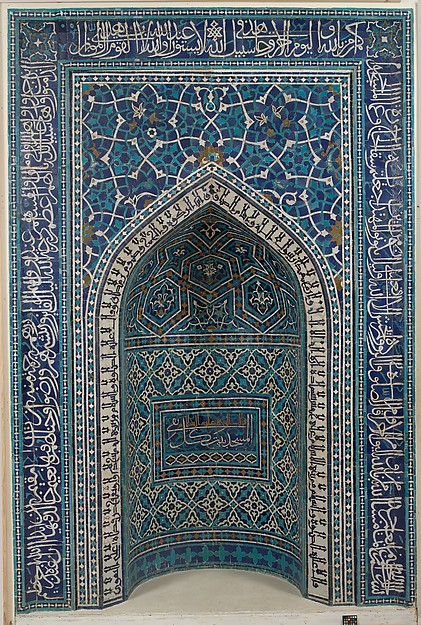FWP:
SETS == MUSHAIRAH
GAZE: {10,12}
VEIL: {6,1}
Here's a strikingly clever 'mushairah verse'. The first line consists of absolutely nothing except four nouns joined by three iẓāfat constructions, so it's quite literally uninterpretable. The fact that the first word is qiblah does, however, set up in us an expectation of religious imagery to come.
When we're finally, after the usual delay created under mushairah performance conditions, allowed to hear the second line, at first our expectation of religious imagery is fulfilled. There's an emphasis on continuity and repetition through 'then/again' [phir] and 'that very' [vuhī]. By the time we hear pardah , we can hardly fail to think of the curtain of the Ka'bah, which is the prime and ultimate Qiblah.
But then in classic mushairah-verse style, at the very last possible moment, in the rhyme-word itself, we discover that the curtain belongs not to the Qiblah, but to the beloved's fancy canopied elephant-litter. All the sense of piety and humility and devotion over time that the verse had carefully evoked, is now with a single word transferred to the beloved. (Which of course, given the ghazal's usual human-divine slipperiness, may not ultimately be much of a transfer-- but then again, it may.)
The normal word for a litter is maḥmil , the word that the commentators use when explaining the verse; for discussion and illustrations of litters, see {147,7x}. The word ʿamārī is much less common, and the verse makes no use at all of its specialized meaning as a canopied elephant-litter. For the value of the word lies elsewhere: it enables the 'punch-word' of the verse to be deferred until the very last moment, since it can be positioned as the rhyme-word in a way that maḥmil cannot.
Note for grammar fans: We could read the two lines as end-stopped, so that the first line would be an exclamation or vocative of some kind, while the second would report the presence of the canopied litter. But we could also read them with enjambement, so that they would form a single utterance (the Qiblah is the canopied-litter). In the second line, we also have two ways to read the vuhī . It does make a difference which readings we choose, but the verse is so abstract that it's hard to decide exactly what that difference is.

Nazm:
He has considered the curtain of the elephant-litter to be the curtain of the Ka'bah. (177)
== Nazm page 177